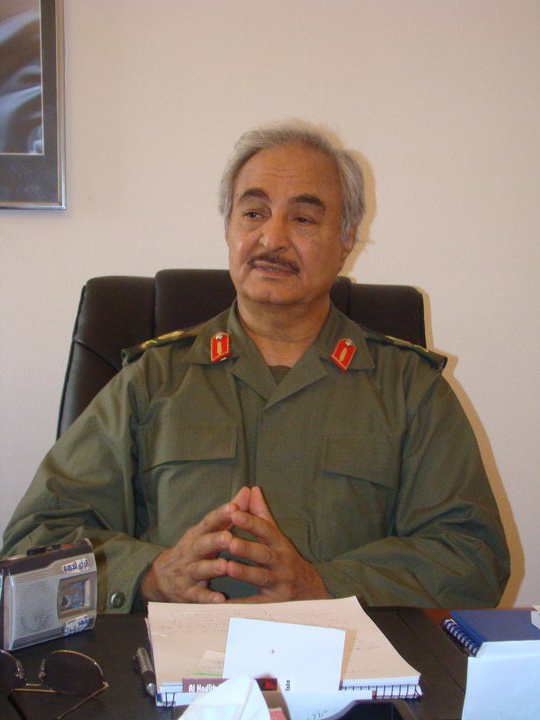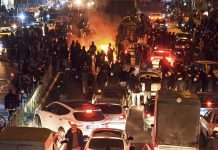The Lebanonization of Libya: Is partition next?
Joyce Karam/Al Arabiya
Thursday, 19 February 2015
The state of chaos in Libya cracking the country between East and West and inviting the specter of both ISIS and al-Qaeda in the Islamic Maghreb, puts the country at a very critical juncture, threatening its unity and reigniting the debate on the value of the 2011 NATO military intervention which helped topple the Muammar Qaddafi regime.
With two parliaments, two governments, many militias and two camps with entirely separate visions for governance, Libya has the recipe for partition absent of an imminent political solution.
Revisiting the 2011 intervention
The blood of 21 Egyptian Copts slaughtered on the Libyan coast by ISIS was yet another alarming sign that the military intervention hailed as a “model” in 2011, has not achieved the desired outcome of transitioning Libya to an inclusive and open democracy. However, it would be an oversimplification to direct sole blame at the NATO intervention for Libya’s woes today, especially given the level of internal polarization inside the country and a proxy civil war fueled by regional actors, and jeopardizing the country’s unity.
The Lebanonization of Libya is also evident in the outside meddling in the countryBen Fishman, a consulting senior fellow at the International Institute for Strategic Studies, describes the situation in Libya as “a state of civil war between two loosely aligned coalitions.” The first supports the elected House of Representative based in Tobruk and its government and is accepted by the International community and “the other refuses to recognize the results of the July 2014 elections and is based in Tripoli, with support from Misrata” and is mostly made of Islamist parties.
Fishman who served for four years on the National Security Staff at the White House and addressed the situation in Libya until late 2013, says in an interview that it is “too early to judge the 2011 intervention.” Intervening in Libya was primarily prompted by the by the humanitarian principle known as the responsibility to protect (R2P) and not as a nation-building project, he adds and it helped rid the country “of a tyrant who oppressed Libyans for four decades.” The argument in defense of the intervention also juxtaposes Qaddafi’s playbook with Syria’s Assad as evidence that Libya might not have been in a better shape if his regime was still in power.
However, Libya’s slide into civil war is forcing a reexamination of the 2011 intervention, that could strip the Barack Obama Presidency from what was once a successful foreign policy legacy. After all, the summer of 2012 marked Libya’s first democratic elections in 40 years and brought to office secular and moderate leaders. This did not last long as Islamists rejected the new form of governance, and militias sprouted across the country.
It is unclear, says Fishman, whether the Obama administration could have done more at the early stages of the post-intervention period: “Maybe we should have been more forceful with our Libyan friends and demanded progress on the transition and particularly demobilizing the militias”. But the history of Libya’s colonization was always in the background, says the former U.S. official, describing the Libyan people as “fiercely independent.” At the end of the day “it was decisions the Libyans made – and the paralysis of their interim governments – that sabotaged the political process” he concludes.
Lebanonized war in proxy
The civil war in Libya is also fueled by the regional polarization and the clientele militia mindset inside the country. When I interviewed the Libyan Prime Minister Abdullah Al-Thinni last August he drew lessons from the 15-year-long civil war in Lebanon. His warning was clear, the longer that Libya goes without political reconciliation, the more likely it will slide into a long and intensified war.
The Lebanonization of Libya is also evident in the outside meddling in the country. Today, many Arab countries are trading accusations of instilling chaos in Africa’s leading oil producer nation. The accusations include arming, funding militias and allowing foreign fighters into Libya. While this picture parallels with 1975 Lebanon, in the age of ISIS and proliferating terrorism, Libya cannot afford a repeat of Beirut’s long agony.
“The one saving grace of the gruesome ISIS actions is that it may drive opposing Libyan factions to come together” says Fishman. Such an outcome however, has to involve outside regional actors agreeing to a political process in Libya. U.N. Special Envoy Bernardino León was urgent in his plea this week, telling the New York Times that “Libya is falling apart. Politically, financially, the economic situation is disastrous…I don’t think the country can bear a process of months.”
In the midst of all this chaos, the Libyan leaders are under no illusion that their country is at an existential juncture. Al-Thinni told me last August that if no political pact is reached soon, the country will most likely divide between East and West. Such an outcome should set off alarm bells in Europe and the United States and must force a policy debate in those capitals beyond the partisan haggling over the 2011 intervention.



















